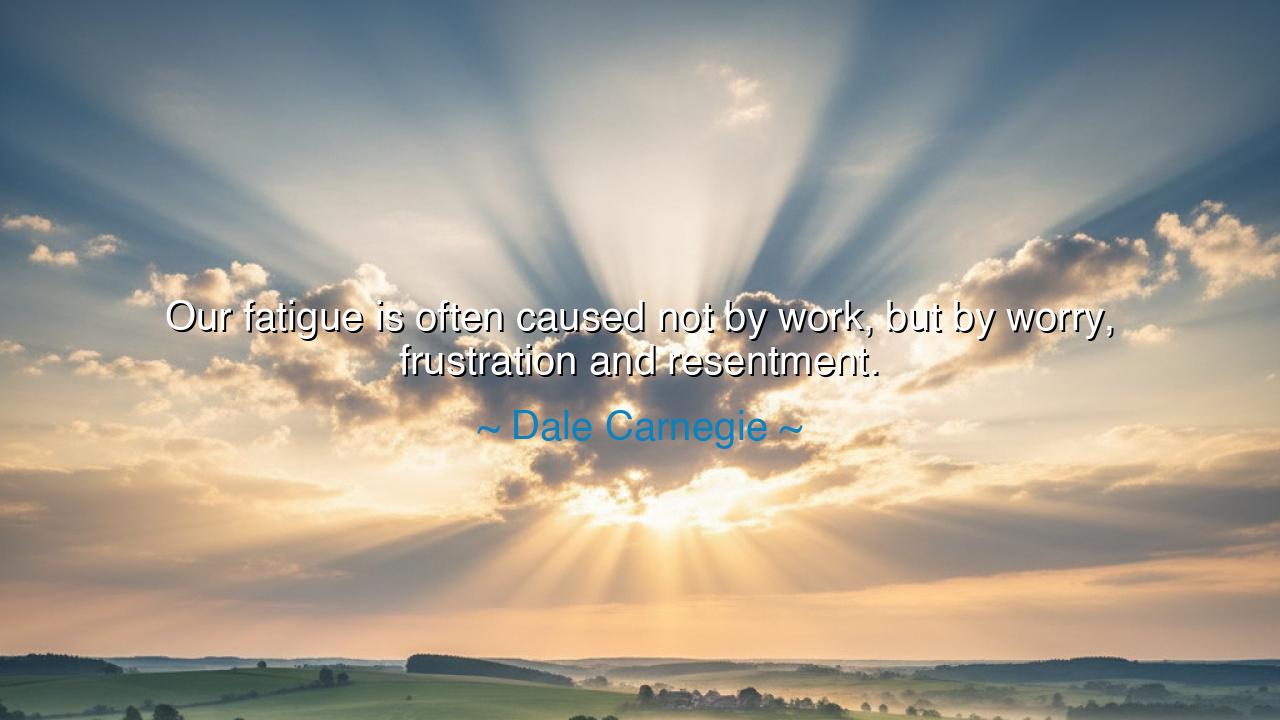
Our fatigue is often caused not by work, but by worry






The teacher of practical wisdom, Dale Carnegie, revealed a truth both simple and profound: “Our fatigue is often caused not by work, but by worry, frustration and resentment.” In these words lies the ancient law of the soul—that the body is not broken by labor alone, but by the hidden poisons of the mind. For toil strengthens, but worry drains; duty uplifts, but resentment corrodes; effort builds, but frustration consumes from within.
The ancients knew this well. They saw the farmer who worked from dawn until dusk yet sang with joy at harvest, his body weary but his spirit light. And they saw the man who lay idle, gnawed by envy and fear, and though his hands were unstained by labor, his face was pale with exhaustion. True fatigue is born not of the muscles, but of the heart entangled in shadowed thoughts.
Worry is the thief of strength, binding the mind to futures that may never come. Frustration is the chain that drags the soul, fastening it to obstacles instead of solutions. Resentment is the fire that burns inward, consuming the vessel that holds it. These unseen labors weigh heavier than any stone, and the man who carries them stumbles long before the one who carries wood or iron.
Carnegie’s wisdom calls us to cast aside these hidden burdens. To work with clear purpose is not to be destroyed, but to be strengthened, as the blacksmith grows stronger by tending his forge. But to work with a heart clouded by bitterness is to weaken even in moments of rest. Thus, the secret to endurance is not merely to master one’s labor, but to master one’s spirit.
Let this truth be passed to future generations: guard your heart against worry, frustration, and resentment, for they are heavier than stone and more wearying than battle. Embrace work with joy, and it will renew you. Cast off the shadows of the mind, and your strength will be multiplied. For the body was made to labor, but the soul was made to shine—and when it shines, even toil becomes light.






HGNguyen Ha Giang
Dale Carnegie’s quote hits home because it reveals how much emotional strain contributes to our overall tiredness. It makes me wonder if, in our fast-paced world, we often ignore the mental toll of stress and frustration. Can we really learn to manage our emotions so that we don’t feel drained by them? How do we prioritize emotional well-being to prevent it from affecting our energy and health?
H112- Thanh Hoa 11A11
This quote resonates because it sheds light on an often-overlooked cause of fatigue—our emotional state. We tend to blame physical exhaustion, but how many times have we felt drained after a stressful situation that had nothing to do with physical activity? How do we break free from cycles of worry and frustration that drain our energy, and how can we create healthier ways to cope with these emotions?
APHung Anh Pham
Carnegie’s insight into fatigue challenges the common perception that exhaustion is simply a byproduct of physical labor. It makes me wonder—how often do we overlook the impact of our thoughts and emotions on our energy levels? Can we learn to identify the sources of our mental fatigue, like frustration or resentment, and take steps to address them? How much does our mindset really shape our physical state?
THHo thi thuy hang
I find this quote eye-opening because it suggests that emotional stress can be just as tiring as physical exertion. When we’re overwhelmed by worry or resentment, it consumes our mental and physical energy. But how do we combat these feelings without them affecting our health? Can we train ourselves to manage negative emotions effectively to reduce fatigue and improve well-being?
QALe Quynh Anh
Dale Carnegie’s quote really makes me think about the hidden causes of fatigue. Often, we think that physical exhaustion is the result of hard work, but Carnegie points out that worry and frustration can be just as draining. Have you ever found yourself mentally exhausted after a long day, even though you weren’t physically active? How much do our thoughts and emotions play into our overall energy levels?